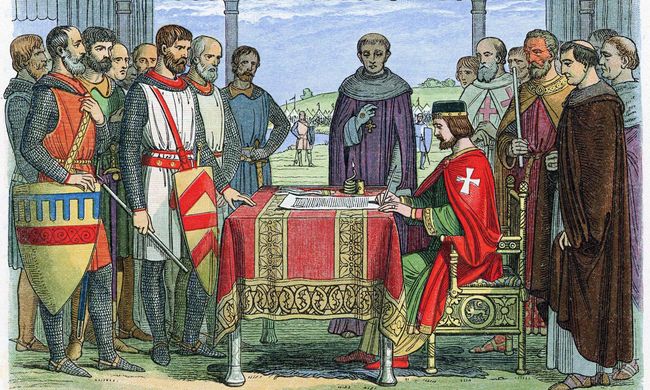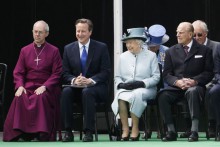The Great Charter of the Liberties’ signing’s 800th anniversary was celebrated on June 15. This document, better known as the Magna Carta, was created on June 15, 1215. It was signed by King John Lackland, who thus agreed to limit the power of the monarchy. Thus, the Magna Carta was the first symbol of freedom, and a very potent one at that, because it guaranteed certain rights and privileges to free people of medieval England. Subsequently, the 63-article Charter formed the basis of the British system of governance.
On the occasion of the memorable date, festive celebrations were held in the valley of Runnymede near London, where the Magna Carta had been actually signed. Queen Elizabeth II, her husband Prince Philip, Prince William, and the country’s Prime Minister David Cameron all were in attendance.
“The limits of executive power, guaranteed access to justice, the belief that there should be something called the rule of law, that there should not be imprisonment without trial – Magna Carta introduced the idea that we should write these things down and live by them. That might sound like a small thing to us today. But back then, it was revolutionary, altering forever the balance of power between the governed and the government,” Cameron stated. He added that “it is our duty to safeguard the legacy, the idea, the momentous achievement of those barons. And there could not be a better time to reaffirm that commitment than on an anniversary like this,” the British prime minister was quoted as saying by The Guardian.
The Day asked British and Ukrainian experts to comment on the Great Charter of the Liberties’ importance for Britain and the world in general.
Sir Andrew WOOD, associate fellow, Russia and Eurasia Program, Chatham House, London:
“The UK has no constitution only in the sense that there is no single written document of the type familiar in most countries that sets it out. Even in those countries that like for instance the United States which have written constitutions those documents are modified over time by court decisions and peoples expectations. In fact, to my mind at least as a general rule the longer the Constitution the worse it works over time. The Yugoslav constitution was a fine example of what happens if you try to cover everything, and the present Russian one too, in a different way, because the Russian Constitutional Court has not exercised the power that for instance the US Supreme Court has done over time.

Engraving from the website THEGUARDIAN.COM
“The British Constitution has evolved over time and is expressed above all in the Common Law, and statutory laws passed over the centuries by Parliament. This makes it different from continental constitutions and the Roman law inheritance enshrined for instance in the Code Napoleon that exists over much of mainland Europe. It also makes it dependent on common assumptions such as the one enshrined in Magna Carta decreeing that everyone, however mighty, must act in accordance with the law. The central characteristic of the Common Law is the rule that court decisions are governed by the precedents set by earlier court rulings, modified by new laws set by Parliament and given the Royal Assent – which by now accepted convention is never refused by the Queen or King. The various structures like parties that compete for control over Parliament have also evolved through historical experience. In one way, you could say that nothing is permanent but in practice the rules are all understood and work pretty well.”
Mykola SIRY, Candidate of Law, senior researcher at the Volodymyr Koretsky Institute of State and Law, the National Academy of Sciences of Ukraine:
“England certainly has a constitution, but the UK’s ‘ID papers’ are shaped and its governance is constituted in a special way. The basic rules of life of the country are entrenched in a number of fundamental laws that are not combined into a single act, what we call a constitution, but they are of constitutional, first-rate importance for the nation. First of all, I mean the Great Charter of the Liberties, signed in 1215. It was a deal between King John Lackland and nobility. They agreed on the basic rules of respect for human values regarding freedom and property.”
What role did the Charter play and how did it affect the global constitutional developments?
“All democratic legal systems have great respect for this historic act. It replaced the military solution to conflicts with a civilized way of concluding a long-term pact of coexistence in society. This Charter has become for many countries a guide and example of resolving most complicated social conflicts involving power relations while taking into account the public interest.”
Ukraine has changed its Constitution several times. What are chief issues with it, in your opinion?
“Pylyp Orlyk’s Constitution of 1710 became a modern example of a solution for complex constitutional and legal problems of regulating life in society. Orlyk’s Constitution, even more clearly than the Charter of 1215, outlined a system of separation of powers, a system of balances in the government. Ukraine also has something to be proud of.
“As for the contemporary constitutional process, we are dealing with a serious imbalance of the social system as a whole. This imbalance prevents more active constitutional process from proceeding as well. Talking about the imbalance of social life, I mean the fact that social groups have not stabilized into orderly entities yet, as we have no stable middle class, and no well-defined, separate interests of labor, backed by a strong trade union movement. There are no strong orderly organizations in agriculture as well, representing agrarian workforce, the farming component of the social structure. So far, these groups have not become well-defined, stable, and secure. This situation allows those who come to power to disregard requirements of the constitution and change it to suit their short-term interests linked to power struggles. It is this situation, on the other hand, which leads to imbalances emerging frequently.”







